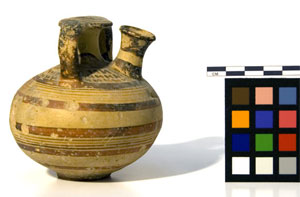

| Vol. XXVI, No. 1April, 2013 |
Articles in Vol. XXVI, No. 1
Digital Data — Ur of the Chaldees: A Virtual Vision of Woolley's Excavations
Preserving data from a very old excavation
-- William B. Hafford
Rethinking CAD Structures — Pompeii Archaeological Research Project: Porta Stabia
Making AutoCAD easier to use effectively
-- Gregory Tucker, University of Michigan, and John Wallrodt, University of Cincinnati
Website Review: Penn Museum
An enormous website with more pluses than minuses.
-- Andrea Vianello
How Often Must We Reinvent the Wheel?
Where do students go to learn about digital technologies?
-- Harrison Eiteljorg, II
Data in the Future — Archived or Locked?
Prison terms for data retrieval?
-- Harrison Eiteljorg, II
Miscellaneous News Items
An irregular feature
To comment on an article, please email
the editor using editor as the user-
name, csanet.org as the domain-name,
and the standard user@domain format.
Index of Web site and CD reviews from the Newsletter.
Limited subject index for Newsletter articles.
Direct links for articles concerning:
- the ADAP and digital archiving
- CAD modeling in archaeology and architectural history
- GIS in archaeology and architectural history
- the CSA archives
- electronic publishing
- use and design of databases
- the "CSA CAD Layer Naming Convention"
- Pompeii
- pottery profiles and capacity calculations
- The CSA Propylaea Project
- CSA/ADAP projects
- electronic media in the humanities
- Linux on the desktop
Search all newsletter articles.
(Using Google® advanced search
page with CSA Newsletter limit
already set.)
Miscellaneous News Items
Solid-State Hard Drives
Solid-state hard drives provide both blessings and curses. How not surprising.
Speed is the blessing; potentially dangerous losses of data are the curses. As the proud owner of a new laptop wth a solid-state hard drive, I can testify to the wonders of the increased speed. The computer starts up much faster, shuts down faster, starts programs faster, and, in general, seems to be much more responsive than its predecessor. (Said predecessor had a slightly faster version of the processor in the computer with the SSD, but it had 8GB or RAM as opposed to 16 in the current model. I have taken the speed increase to be the work of the SSD, not the RAM upgrade and processor downgrade.)
The flip side of the coin, the curse of the solid-state hard drive, is the potential for data corruption ". . . according to a new study titled 'Understanding the Robustness of SSDs Under Power Fault' by researchers from the University of Ohio and HP Labs. In exposing 15 SSDs from five different vendors to power loss, researchers found that 13 suffered such failures as bit corruption, metadata corruption, and total device failure. The paper did not specify which vendors' drives were used." Ted Samson, "Test your SSDs or risk massive data loss, researchers warn" (site last accessed 4/5/13; posting date 3/01/13).
Solid-state hard drives therefore seem to be like so many new devices. They give with one hand and take away with the other.
Android OS fragmented
Users of Apple products have long understood that Apple's benefit/curse is its closed nature. Being a closed system, Apple can dictate far more aspects of the ways things work (or don't). That means that the user has far fewer needs to worry about products that don't "work right" or processes that seem to go awry unexpectedly. On the other hand, Apple owners have also learned to live with products that are generally more expensive, less user-configurable, and harder to expand.
As noted in "Why Facebook Home will blow Android into smithereens," by Jason Perlow for his column, "Tech Broiler" April 5, 2013 at www.zdnet.com/why-facebook-home-will-blow-android-into-smithereens-7000013549/?s_cid=e539, the Android operating system is about to experience the worst sort of fragmentation that Apple systems prevent. The addition of the Facebook "Home for Android" to the Android OS is just the kind of thing that some people love and others hate. Android as an OS is about to become many different things, depending upon the version you happen to have. (This is not really new in the Android world, but the Facebook addition has made it more obvious and suggested greater changes to come.) Apple's iOS, of course, will not suffer this problem. It will also not be readily extensible and alterable by users or large communities of users. As is so often the case, you pay your money and you take your choice. See item 1.
Academic Journals as Money-Making Ventures
I have noticed several random requests to submit articles to odd-sounding journals arriving in various of my email in-boxes over the least couple of years. A recent article in the NY Times explains why. The article, "Scientific Articles Accepted (Personal Checks, Too)," by Cina Klata at www.nytimes.com/2013/04/08/health/for-scientists-an-exploding-world-of-pseudo-academia.html?pagewanted=all&_r=0 describes a new scam that seems to offer publication in a prestigious journal, usually online. In reality, the aim of the email is — surprise, surprise — money. After submitting the article, the author will be billed a significant page fee, previously undisclosed in most cases. This is a doubly-dangerous system, because the journals do exist, and they are often confused with peer-reviewed journals and taken to be serious publications. They not only confuse potential contributors, they confuse readers as well, making it even harder to be sure what web resources are trustworthy.

All articles in the CSA Newsletter are reviewed by the staff. All are published with no intention of future change(s) and are maintained at the CSA website. Changes (other than corrections of typos or similar errors) will rarely be made after publication. If any such change is made, it will be made so as to permit both the original text and the change to be determined.
Comments concerning articles are welcome, and comments, questions, concerns, and author responses will be published in separate commentary pages, as noted on the Newsletter home page.